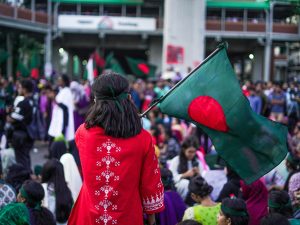On January 8th, 2023, supporters of Brazil’s former President Jair Bolsonaro marched from the Army Headquarters in Brasilia, the capital of the country, in a bid to orchestrate a military coup following the inauguration of the democratically elected president Lula on January 1st of the same year. Similar to the invasion of the United States Capitol, over 1,400 people invaded the Three Powers Plaza in Brasília, where they heavily vandalized the Supreme Court, the Congress building, and the Planalto Presidential Palace.
This violent event rapidly captured the world’s attention. What has been less explored, however, is that a substantial proportion of those involved in the riots were Evangelicals_ a rapidly growing Protestant Christian group, increasing from 5% of Brazil’s population in 1970 to 31% in 2023 who have also played an increasingly relevant role in Brazilian politics over the last few decades. How did Bolsonaro mobilize Evangelicals during and after his presidency, and how did the latter contribute to the events of January 8th?
BOLSONARO AND THE EVANGELICAL MOVEMENT
The relationship between Bolsonaro and Evangelicals began long before his 2018 election. Although Bolsonaro himself is Catholic, his perceived alignment with Christian values has resonated with many influential Evangelical leaders and pastors, who viewed him as a symbol of resistance against the perceived rise of secularism and leftist ideologies in Brazilian society. With their support, Bolsonaro was able to capitalize on Evangelical voters who were attracted to his conservative stance on issues such as abortion and LGBTQ+ rights, his unwavering support of Israel, and his promises to combat corruption and implement law and order policies.
As a token of gratitude for the significant Evangelical support in the 2018 elections, Bolsonaro selected several Evangelicals for prominent roles within his administration. Notable among them were three pastors who served as the Minister of Women, Family and Human Rights (Damares Alves), the Minister of Education (Milton Ribeiro) and the Supreme Court justice (André Mendonça).
Through this experience, Evangelicals rapidly discovered that they could convert their growing religious presence in Brazilian society into political representation and access to spheres of power to consolidate and expand their strength and representation in the country. Churches found a successful strategy for political influence by changing how politics should be seen by its adherents. Previously, deeply religious individuals often stayed clear of politics; now, their active participation in politics is seen as a form of resistance, with some of them even condoning violence as a necessary means of taking control in a society that has derailed and wanders off to its own demise.
THE INVASION
After receiving news that Lula had won the latest elections, leaders and influential figures within the Evangelical community urged their followers to view the situation from a spiritual perspective. Shortly after, on January 8th, 2023, the capital of Brasilia was attacked by tens of thousands of Jair Bolsonaro loyalists, many of them Evangelicals. Footage of individuals reciting Christian prayers and singing hymns while storming buildings became viral online. One particular video shows a group praying inside the Senate assembly room while it was being invaded by other protesters while a man repeatedly yells in Portuguese, “Brazil belongs to the Lord Jesus. […] If you are a Christian, come to the Congress. The Congress is ours, the people of God, until military intervention.” In another clip, dozens of believers are recorded singing a Christian hymn while others pray on their knees. According to the Federal District, out of 1,398 imprisoned protesters, four well-known Evangelical pastors and gospel singers were detained.
The power of local elites in mobilizing support for a political cause has already been well-established in several academic studies. In Brazil, like many other countries shaped by entrenched doctrines, religious leaders have a strong cultural preeminence and are traditionally revered, thus granting them significant influence over their congregation and a potentially large role in political movements. It is not surprising then that numerous Evangelical groups, particularly Neo-Pentecostal churches, participated in the attempted takeover.
The invasion also confirmed that a well-organized section of the population was eager to see a military dictatorship rise to power. According to a study conducted by Atlas/Intel in January 2023, 64% of Evangelicals are favourable to a military takeover in Brazil. Given that only 28% of Evangelicals saw Lula’s election as legitimate, it is not surprising then that 31% of Evangelicals saw the invasion of the capital as legitimate as opposed to only 18% of the Brazilian population. For those believers, democracy is no longer capable of standing up for churches and conservative values; therefore, the only effective measure would be a coup to guarantee a state aligned with their principles.
THE AFTERMATH
Although the loss of the former president Bolsonaro in 2022 is seen as a victory for Brazilian democracy, the persistence of Bolsonarism, referring to the political approach and beliefs adopted by Bolsonaro and his supporters as a political movement, should not be underestimated. As the 2023 invasion of the capital has shown, its adherents continue to pose a significant threat. Since then, the Evangelical bench in the Brazilian Congress, composed of conservative Christian leaders and lawmakers who advocate for traditional family values, anti-abortion policies, and religious freedom, has remained strong. Their newly-elected leader, the congressman Eli Borges (who happens to be an Evangelical pastor), said in an interview that there are some “terrific people” detained due to the violent attack on January 8th, and argued that the “majority, in good faith, […] singing the national anthem with the national flag, was at the service of the consolidation of Brazilian democracy.”
Finally, this invasion emphasizes the perilous consequences of the proliferation of the global populist movements and the impact they can have on democracy. For many right-wing Brazilian Evangelicals, political positions are not simply a matter of preference but stem from deep-seated and often misinterpreted theological beliefs, promoting a narrow and incomplete understanding of national identities. The rise of populist movements in countries such as (but not limited to) Brazil and the United States have revealed the growing influence of religious and/or populist nationalisms, which are forging stronger transnational ties and challenging the core principles that democratic institutions are founded upon. Whether these new waves of religious populism movements will endure remains to be seen.











